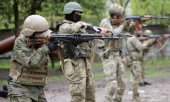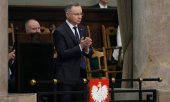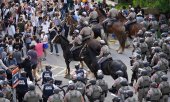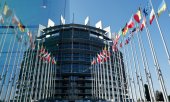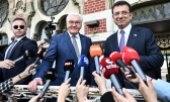Seven years after his Sorbonne speech of 2017 and five years after publishing his ideas for a European renaissance ahead of the 2019 EU elections, Emmanuel Macron delivered another impassioned speech at the Parisian university on Thursday. "Europe could die" if it fails to implement key security and economic policy decisions, he warned. Commentators take stock.
From 6 to 9 June, the citizens of the EU will elect a new European Parliament. "The world's only directly elected transnational assembly", as the official information on the election states, will then pass laws that affect "all areas of life" in the EU. Europe's press is well aware of the significance of the elections, as a glance at the opinion sections shows.
In an interview with Fakt, Poland's President Andrzej Duda said the country was ready to host the nuclear weapons of Nato partners to strengthen the alliance's eastern flank against Russia. Although the idea had apparently not been previously coordinated with the government, Prime Minister Donald Tusk has expressed his willingness to discuss it with Duda. The Polish press takes a critical stance.
Anger over the humanitarian disaster caused by the Gaza war has caused the protests at several US universities to escalate, with a few anti-Semitic incidents also being reported. At New York's renowned Columbia University, police arrested more than a hundred people. Teaching has been restricted to online lectures. Europe's press looks behind the scenes and draws historical comparisons.
Spanish Prime Minister Sánchez has announced that he will be taking a break from his official duties for a few days. In a "letter to the public" he wrote that he needed to "stop and reflect" and would announce a decision on whether he will resign next Monday. The move was prompted by a lawsuit filed by the right-wing organisation Manos Limpias against the prime minister's wife, Begoña Gómez, regarding allegations of corruption.
Timur Ivanov, Russia's deputy defence minister in charge of military infrastructure projects has been arrested in Moscow. The wealthy top-ranking official who is considered a close confidant of his boss Sergei Shoigu is accused of accepting bribes. Commentators speculate on what is behind the affair.
After much wrangling the two chambers of the British Parliament have voted in favour of the Conservative government's controversial Rwanda deal, which declares Rwanda a safe third country despite the Supreme Court's ruling that it is not. Prime Minister Rishi Sunak wants the first deportation flights to depart in ten to twelve weeks. Scepticism is rife among commentators.
Thursday marks the 50th anniversary of the fall of Portugal's Salazar dictatorship. The Carnation Revolution symbolises Portugal's path to democracy, European integration and the relinquishing of its colonies. The press reflects on the state of the country against the backdrop of the most recent parliamentary elections in which the Chega party, which is ideologically close to the Salazar regime, became the third strongest political force in the country.
German President Frank-Walter Steinmeier is the first high-ranking German representative to travel to Turkey since Erdoğan's defeat in the country's local elections. The occasion is the 100th anniversary of diplomatic relations between the Turkish Republic and Berlin. Commentators look at why Steinmeier first visited the opposition-led city of Istanbul before travelling to Ankara to meet President Erdoğan.
Just under seven weeks before the European Parliament elections on 9 June, the polls predict a significant increase in votes for right-wing populist and far-right parties of the ID (Identity and Democracy) Group. Together with the ECR (European Conservatives and Reformists), which also includes the Fratelli d'Italia, they could win over a fifth of the seats. Commentators discuss the possible repercussions.



